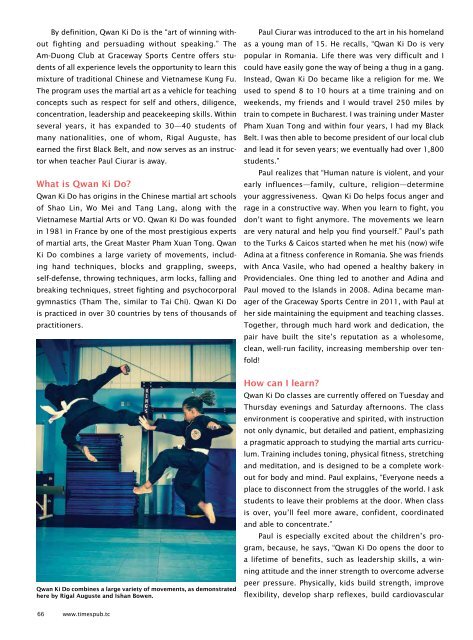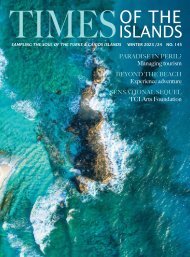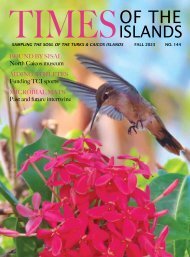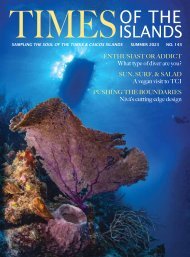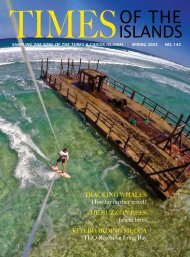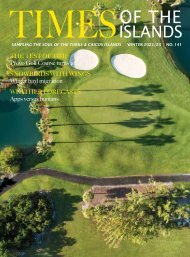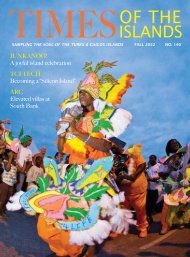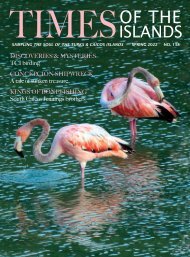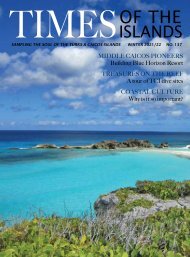Times of the Islands Fall 2017
Presents the "soul of the Turks & Caicos Islands" with in-depth features about local people, culture, history, environment, businesses, resorts, restaurants and activities.
Presents the "soul of the Turks & Caicos Islands" with in-depth features about local people, culture, history, environment, businesses, resorts, restaurants and activities.
- No tags were found...
You also want an ePaper? Increase the reach of your titles
YUMPU automatically turns print PDFs into web optimized ePapers that Google loves.
By definition, Qwan Ki Do is <strong>the</strong> “art <strong>of</strong> winning without<br />
fighting and persuading without speaking.” The<br />
Am-Duong Club at Graceway Sports Centre <strong>of</strong>fers students<br />
<strong>of</strong> all experience levels <strong>the</strong> opportunity to learn this<br />
mixture <strong>of</strong> traditional Chinese and Vietnamese Kung Fu.<br />
The program uses <strong>the</strong> martial art as a vehicle for teaching<br />
concepts such as respect for self and o<strong>the</strong>rs, diligence,<br />
concentration, leadership and peacekeeping skills. Within<br />
several years, it has expanded to 30—40 students <strong>of</strong><br />
many nationalities, one <strong>of</strong> whom, Rigal Auguste, has<br />
earned <strong>the</strong> first Black Belt, and now serves as an instructor<br />
when teacher Paul Ciurar is away.<br />
What is Qwan Ki Do?<br />
Qwan Ki Do has origins in <strong>the</strong> Chinese martial art schools<br />
<strong>of</strong> Shao Lin, Wo Mei and Tang Lang, along with <strong>the</strong><br />
Vietnamese Martial Arts or VO. Qwan Ki Do was founded<br />
in 1981 in France by one <strong>of</strong> <strong>the</strong> most prestigious experts<br />
<strong>of</strong> martial arts, <strong>the</strong> Great Master Pham Xuan Tong. Qwan<br />
Ki Do combines a large variety <strong>of</strong> movements, including<br />
hand techniques, blocks and grappling, sweeps,<br />
self-defense, throwing techniques, arm locks, falling and<br />
breaking techniques, street fighting and psychocorporal<br />
gymnastics (Tham The, similar to Tai Chi). Qwan Ki Do<br />
is practiced in over 30 countries by tens <strong>of</strong> thousands <strong>of</strong><br />
practitioners.<br />
Paul Ciurar was introduced to <strong>the</strong> art in his homeland<br />
as a young man <strong>of</strong> 15. He recalls, “Qwan Ki Do is very<br />
popular in Romania. Life <strong>the</strong>re was very difficult and I<br />
could have easily gone <strong>the</strong> way <strong>of</strong> being a thug in a gang.<br />
Instead, Qwan Ki Do became like a religion for me. We<br />
used to spend 8 to 10 hours at a time training and on<br />
weekends, my friends and I would travel 250 miles by<br />
train to compete in Bucharest. I was training under Master<br />
Pham Xuan Tong and within four years, I had my Black<br />
Belt. I was <strong>the</strong>n able to become president <strong>of</strong> our local club<br />
and lead it for seven years; we eventually had over 1,800<br />
students.”<br />
Paul realizes that “Human nature is violent, and your<br />
early influences—family, culture, religion—determine<br />
your aggressiveness. Qwan Ki Do helps focus anger and<br />
rage in a constructive way. When you learn to fight, you<br />
don’t want to fight anymore. The movements we learn<br />
are very natural and help you find yourself.” Paul’s path<br />
to <strong>the</strong> Turks & Caicos started when he met his (now) wife<br />
Adina at a fitness conference in Romania. She was friends<br />
with Anca Vasile, who had opened a healthy bakery in<br />
Providenciales. One thing led to ano<strong>the</strong>r and Adina and<br />
Paul moved to <strong>the</strong> <strong>Islands</strong> in 2008. Adina became manager<br />
<strong>of</strong> <strong>the</strong> Graceway Sports Centre in 2011, with Paul at<br />
her side maintaining <strong>the</strong> equipment and teaching classes.<br />
Toge<strong>the</strong>r, through much hard work and dedication, <strong>the</strong><br />
pair have built <strong>the</strong> site’s reputation as a wholesome,<br />
clean, well-run facility, increasing membership over tenfold!<br />
Qwan Ki Do combines a large variety <strong>of</strong> movements, as demonstrated<br />
here by Rigal Auguste and Ishan Bowen.<br />
How can I learn?<br />
Qwan Ki Do classes are currently <strong>of</strong>fered on Tuesday and<br />
Thursday evenings and Saturday afternoons. The class<br />
environment is cooperative and spirited, with instruction<br />
not only dynamic, but detailed and patient, emphasizing<br />
a pragmatic approach to studying <strong>the</strong> martial arts curriculum.<br />
Training includes toning, physical fitness, stretching<br />
and meditation, and is designed to be a complete workout<br />
for body and mind. Paul explains, “Everyone needs a<br />
place to disconnect from <strong>the</strong> struggles <strong>of</strong> <strong>the</strong> world. I ask<br />
students to leave <strong>the</strong>ir problems at <strong>the</strong> door. When class<br />
is over, you’ll feel more aware, confident, coordinated<br />
and able to concentrate.”<br />
Paul is especially excited about <strong>the</strong> children’s program,<br />
because, he says, “Qwan Ki Do opens <strong>the</strong> door to<br />
a lifetime <strong>of</strong> benefits, such as leadership skills, a winning<br />
attitude and <strong>the</strong> inner strength to overcome adverse<br />
peer pressure. Physically, kids build strength, improve<br />
flexibility, develop sharp reflexes, build cardiovascular<br />
66 www.timespub.tc


